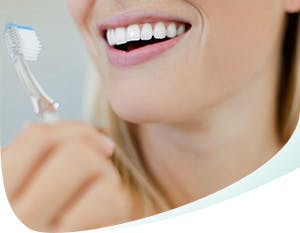What Is Daytime Bruxism and What Does it Do to Your Teeth?
Take a deep breath and relax your shoulders and unclench your jaw. If you didn’t even notice that your jaw was clenched tight, you might have a condition called bruxism. Learn about this condition, how it can affect your teeth and how to manage it.

What Is Daytime Bruxism?
Bruxism is a condition where you unconsciously and habitually grind, gnash or clench your teeth.1,2 While many people may clench their teeth during daytime hours, generally referred to as daytime bruxism, others with nighttime bruxism may continue this behavior in their sleep.1 The main cause of bruxism has not yet been determined, but it is believed to be multifactorial.6
While diagnosing bruxism may take some time, there are a few telltale symptoms to be on the lookout for:1,3
- Pain that feels like an earache
- Soreness or pain in your jaw, neck or face
- Jaw muscles that are locked up or very tired
- A popping sound when you open your mouth, indicating soreness in the jaw
- Pain or sensitivity in your teeth
- Worn tooth enamel that exposes the underlying dentin
- Headaches that begin at the temples
- Structure damage to the teeth including chips, fractures and worn-down areas on the biting surfaces that have been rubbed together
If you’re not sure if this pertains to you, take time during the day to notice when you’re overly tense and might be clenching your teeth. If it happens more than you expect, you may want to bring it up to your dentist.
What Causes Daytime Teeth Grinding?
It is suggested that people who grind their teeth during the day may do so as a response to internal or external stimuli.1 Studies have strongly suggested that bruxism during daytime hours is related to emotional stress, anxiety, anger, frustration or tension.1,4 It is also thought to be a coping strategy to manage these big emotions, or simply a habit developed during periods of intense concentration.1
Daytime bruxism is a non-functional behavior, in that it isn’t necessary and usually isn’t controlled.6 It’s characterized by tooth-on-tooth contact that is repetitive (grinding) or sustained (clenching).5 One study collected data from five different countries to determine whether daytime bruxism was related to stress.5 The results suggested a significant association between teeth grinding during the day, muscle pain, tooth wear and subjects who experienced a high degree of stress, especially those with stressful occupations or emotional disorders.5
Other potential reasons that one may grind their teeth during the day include:1,2
- Caffeine consumption
- Using tobacco
- Certain medications, including some antidepressants
- Family members who experience bruxism
- Other health disorders like Parkinson’s disease, dementia, GERD and sleep-related disorders
What Daytime Bruxism Does to Teeth and How to Manage it
If you suspect that you are grinding your teeth, your dentist will examine your teeth for damage. They’ll look for tenderness in your jaw muscles inside of your cheeks.1
Repeatedly grinding and clenching your teeth can be detrimental to your oral health.4 Studies suggest that when you’re grinding your teeth, whether it’s during the day or while you’re sleeping, you’re doing so with six times the force you normally use to chew your food.4 This excess force can result in damaged enamel, tooth pain or cracked and broken teeth.4 It can also cause damage to your gums and jawbone, which puts you at risk for loosened teeth or tooth loss.4
In terms of managing your daytime tooth grinding, there are a few options:3
- Mouthguard. While mouthguards are usually used for nighttime teeth grinding, if you find that your daytime bruxism is truly excessive, you may choose to use one during the day as well. Not only will it act as a physical barrier to keep you from damaging your teeth, but it may act as a means to notice and change your behavior.
- Behavior changes. You may need to work with a dentist or an interdisciplinary team to make these sorts of changes, especially since your behavior is likely very well established. You may need to learn how to properly close your mouth and place your tongue to avoid damage.
- Biofeedback. This treatment option is relatively new and measures the amount of muscle activity in the jaw and mouth.3 This real-time feedback device can be helpful for those who grind their teeth during the day, so they can learn to put a stop to the behavior.
- Medication. Tooth grinding may be associated with certain antidepressant medications.
No toothpaste can reverse the damage caused by bruxism. However, behavioral changes like managing daytime teeth clenching and grinding can prevent further damage from bruxism. Moreover, taking steps to repair the outermost layer of your teeth is crucial for good oral health.
Source Citations :
- Bruxism (teeth grinding). Mayo Clinic. https://www.mayoclinic.org/diseases-conditions/bruxism/symptoms-causes/syc-20356095. Accessed 7/7/23.
- Your teeth and jaws under pressure. Journal of the American Dental Association. https://jada.ada.org/article/S0002-8177(17)31105-4/fulltext#secsectitle0020. Accessed 7/7/23.
- Bruxism. Johns Hopkins Medicine. https://www.hopkinsmedicine.org/health/conditions-and-diseases/bruxism. Accessed 7/7/23.
- What is bruxism? Journal of the American Dental Association. https://jada.ada.org/article/S0002-8177(21)00381-0/fulltext. Accessed 7/7/23.
- Is There Association Between Stress and Bruxism? National Library of Medicine. https://www.ncbi.nlm.nih.gov/pmc/articles/PMC7793806/. Accessed 7/7/23.
- Bruxism Management. National Library of Medicine. https://www.ncbi.nlm.nih.gov/books/NBK482466/. Accessed 11/21/2023.



